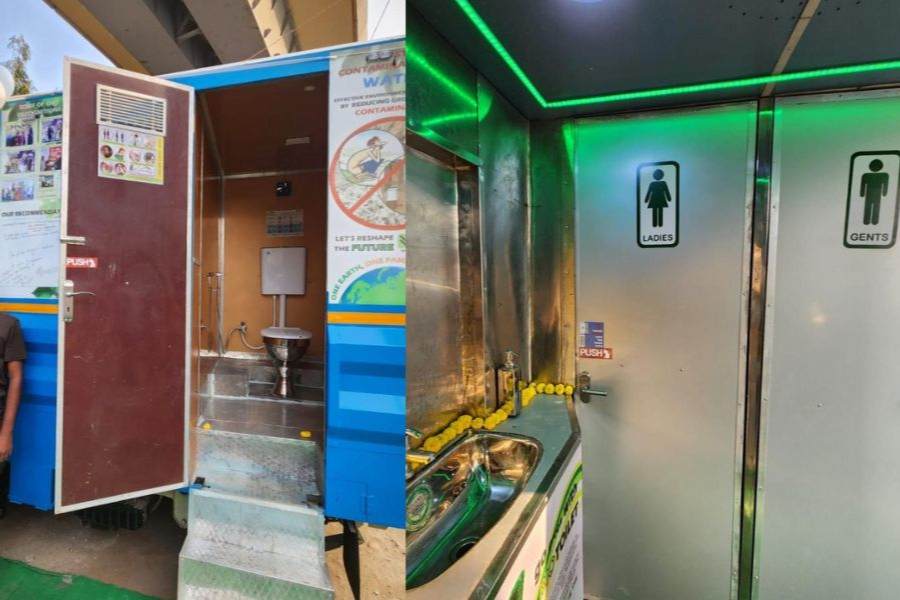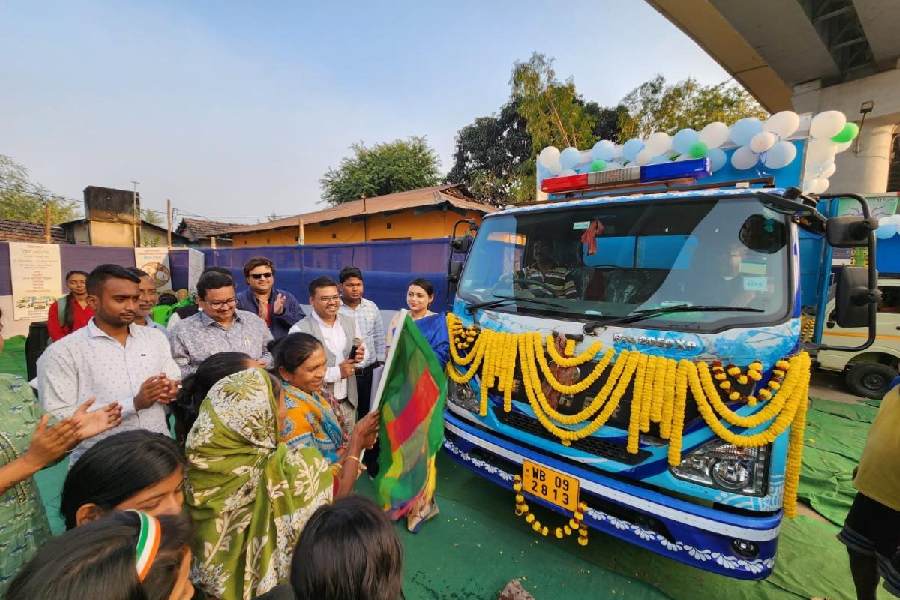A concert in a field, a parade on a road, a wedding on a beach... While these sound like dream destinations, imagine what a nightmare they would be in terms of sanitisation. Where would the guests go to relieve themselves?
Enter “Toilet to Let” bio-toilets on wheels, a new, patented invention by two Bengal-based sanitisation crusaders. Their maiden fleet was launched on December 30 at the entry point of Duttabad. Local councilor Rajesh Chirimar did the honours.
“These are toilet cabins fixed on mini-trucks and so can be driven to any destination. Using our patented chemical formula, 95 per cent of the waste generated in these toilets gets converted into water fit enough to water plants with or flush toilets,” said Arijit Banerjee, whose company Ramaesis RPL Perfect Pause is rolling out the vehicles.
He and his wife Arpita Roy hold the patent for the chemical to convert the waste. “Other portable toilets in the market cannot do this conversion and simply collect the waste that has to be manually and unhygienically removed later,” explains Banerjee.
Their company has been making prefabricated toilets using their conversion chemicals since 2016. “We’ve installed many of these at construction sites for labourers. We have another model of toilets that is tractor-pulled as well as AI-integrated auto wash toilets that are used in our airport, among other locations,” says Banerjee, who has been given the moniker Toilet Man of Bengal, by the ministry of micro, small and medium industries.
How it works
The company launched four vehicles last week but their target is a fleet of 40 by the end of 2024.
Of the two models rolled out, the smaller vehicle is a modified Tata Ace Gold and has two western-style toilets fitted in. Users are to reach them by climbing the three-step foldable staircase that opens up.
The bigger vehicle is an Eicher Pro 2059XP and has four toilet cabins - two Indian and two Western-style - and a wash basin in between. Once you enter the cabins and lock The lights are on power-saving mode and work using the vehicle’s battery power backup system. The water for the commode and basin comes from a tank above the car. At the bottom is another tank that collects the waste. “Our bio-toilets have been in use since 2016 and to date, the waste has had to be removed only once from one toilet, and that too, because of misuse. Someone had tried to flush a sanitary napkin,” Banerjee says.
The commodes are made of stainless steel. “Ceramic commodes would crack easily given the undulating roads the vehicles would cover. It would also stand a better chance against users with poor toilet habits,” Banerjee reasoned.

(Left) One of the mini-trucks with a door into the toilet ajar; (Right) The interiors of the truck, with cabins marked for “ladies” and “gents”
Inside the cabins are standard warnings against disposing in the commode items like plastic bags and sanitary napkins. It also has a diagram of how anaerobic bacteria in bio-toilets convert human waste into water and small amounts of gases.
About 500 people can use the big truck a day and 300-400 people can do the same in the small truck.
Need of the area
Chirimar, who inaugurated the vehicles, predicted they would be of great use in his ward, part of which comprises the added area of Duttabad. “When financially backward residents hold weddings under pandals in fields, how are they supposed to arrange toilets? Let alone guests, even the bride and groom must return home to relieve themselves during the ceremony,” explained Chirimar. “These vehicles will be of great use here.”
The trucks would be up for hire at between Rs 1,800 and 3,000 per cabin per day but the exact amount depends on location, as the trucks must be driven over from their godowns in Salt Lake and Joka. “But we shall make concessions for anyone hiring the trucks from this ward,” promised Banerjee.
“The rooftops of our houses have sloping tiles and no terrace so any social gathering must be held at this very field,” said Alaka Das, a resident of Duttabad who attended the launch. “And at such functions, we have to request neighbours to let guests use their personal toilets. Even if these trucks come at a price, anyone holding functions would be willing to pay for the convenience.”
The helpline for the vehicles is 8017012147.
